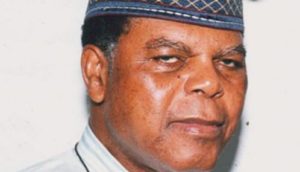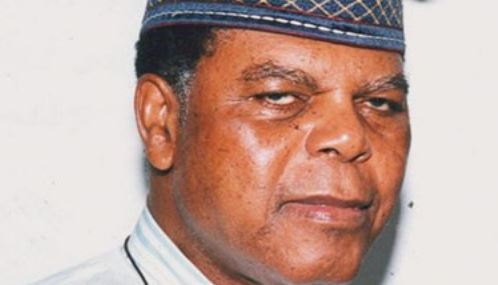 At 24, Michael Christopher Onajierevbe Ibru took a bold step. He partnered with his friend and former colleague, Jimmy Large, to create Laibru, a trading company that later grew into a conglomerate of almost 25 companies, becoming one of the largest indigenous conglomerate in Africa.
At 24, Michael Christopher Onajierevbe Ibru took a bold step. He partnered with his friend and former colleague, Jimmy Large, to create Laibru, a trading company that later grew into a conglomerate of almost 25 companies, becoming one of the largest indigenous conglomerate in Africa.
Born into the family of Epete Ibru, a missionary worker who also worked as a nursing superintendent at Igbobi Orthopaedic Hospital, Lagos, Mr. Ibru was the first of seven children. His mother, Janet Omotogor Ibru, sold fish in the creeks of Niger Delta to help with the family’s upkeep.
At 18, Mr. Ibru enrolled at Igbobi College, Lagos, where he excelled in academics and extracurricular activities culminating in his appointment as the senior prefect in his last year in school. His academic abilities became evident in 1948 when he moved straight from Elementary School to Secondary Class 2. In his fourth year in a study that usually lasted six years, Mr. Ibru passed the Cambridge School Certificate Examination with Distinction.
The ‘mortuary fish’ magnate
Mr. Ibru joined the United African Company (now UACN) in 1951, immediately after leaving Igbobi College, as manager-in-training – one of the few fresh school leavers to hold such position.
It was at UAC he met Mr. Large, a meeting that changed the course of his life forever. Laibru was founded.
In 1957, the company ventured into the frozen fish market, a lucrative enterprise that was difficult to penetrate. While their contemporaries, mostly expatriate firms, played safe by trading in imported fish, Laibru delved into production and marketing of frozen fish.
His competitors, including meat-sellers, labelled his products “mortuary fish”, but Laibru’s sustained campaign that frozen fish was good eventually paid off. The company moved on to establish over 300 distribution depots across Nigeria.
He used the facility at night and traded from the back of a Land Rover, before building his own storage facilities as 33 Creek Road, Apapa.
Before Mr. Ibru’s foray into frozen fish, the market had gained a poor reputation in Nigeria.
In the early 1950’s, the Commonwealth Development Corporation had attempted to establish a fishing venture in the Nigerian waters with cold storage facilities and a distribution operation through the West African Fisheries and Cold Stores.
They failed, largely due to insufficient fish stocks in the Port Harcourt waters and inappropriate boats, coupled with marketing and distribution challenges.
When Ibru fish was rolled out, it was the women from Urhobo, Mr. Ibru’s tribe, who were the first Nigerians to embrace it, encouraging the greater population to follow suit.
By the mid-1960’s, Mr. Ibru had become a millionaire from fish trading.
In the 1970’s, Mr. Ibru was responsible for about 60 percent (150,000 – 200,000 tons) of the Nigerian frozen fish market, with turnover hitting over N90 million.
The making of a dynasty
In 1963, Mr. Ibru chartered his first fishing vessel from Taiyo Gyogo of Japan, and two years later, in partnership with a Japanese conglomerate, he founded Osadjere Fishing Company, one of the largest fishing companies in the world.
With Mr. Gyogo holding 30 percent equity and providing the management for deep sea trawlers and shrimpers, the company began operation with three long distance freezer trawlers.
But a harsh business environment forced the company to cease operations till 1974, when it reorganised its fleet of about 25 trawlers.
In 1965, Mr. Ibru established Aden Farm, a large palm oil plantation that also included citrus and pineapple, on an 800 hectares of land in the old Bendel State. He later acquired Mitchell Farm, in 1973, from its American owners, Alizar, who had established it a decade earlier. The farm grew to become the largest supplier of day old chicks and processed poultry in West Africa.
In 1969, Mr. Ibru founded Rutam, a transportation arm of his business that dealt in marketing and distribution of Mazda, Saviem, Tata, and Jeep brands of automobiles. Later, the federal government appointed Rutam the major distributor of Peugeot vehicles in Nigeria.
Another business enterprise, Nigerian Hardwoods, a logging, saw milling, and wood processing company was acquired in 1974. The company, owned by the Lathem Group, UK, was originally established in 1919 and exported logs of hard wood.
Decades later, Ibru had become a household name, expanding into petroleum oil and storage (Ibafon Oil Limited); aviation (Aero Contractors); banking (Oceanic Bank); agriculture (Mitchell Farms, Aden Farm); publishing (The Guardian); hospitality (Ikeja Hotels Plc – Lagos Sheraton and Federal Palace Hotels); insurance (Minet Nigeria Ltd); beer brewing (in his home town, Agbarha-Otor), among others.
Mr. Ibru’s early success in business was attributed to the immense roles played by members of his immediate family: his younger brother, Felix, served as a part-time clerk for Laibru; his mother’s familiarity with fish pricing and the Niger Delta creeks were invaluable; while his father, austere in nature, served as the company’s bank.
These roles were to play a huge part in the inclusion of Mr. Ibru’s siblings, wives, children, and associates in the management of his conglomerate.
Some of the awards bestowed on Mr. Ibru include the Officer of the Order of the Federal Republic (OFR) in 1981; Outstanding Businessman Award of the Nigerian American Chamber of Commerce and Industry, 1983; Honorary Doctor of Laws (Hon. LL.D.) of the University of Benin, 1978, and University of Ibadan, 1978; Doctor of Agriculture (Honoraries Causa), University of Agriculture, Abeokuta, 2004.
In 2003, Mr. Ibru won the Zik Prize in Leadership. Two years later, he received the prestigious Dr. Kwame Nkrumah Excellence in Enterprise Award.
In 2004, the Urhobo nation presented him with the Chief Mukoro Mowoe Service Award, for his “peerless performance in pioneering commerce and industry; trusting and employing large numbers of Urhobos; supporting and participating in Urhobo causes and traditions; and generally uplifting the image and name of Urhobo.”
Perhaps, one of Mr. Ibru’s greatest legacies remains a college – Abraham College – he donated to his people.
The college is known today as Ibru College.
In a tribute to mark Mr. Ibru’s 80th birthday six years ago, Peter Ekeh, chairman of the Urhobo Historical Society, said the business mogul’s genius lay in his uncanny ability to fathom the unmet needs of the Nigerian population and to find ways to meet those needs.
“As illness compels Olorogun Michael Ibru to sojourn into the sunset of his life, his admirers can rest assured that his legacy is secure in Nigeria’s history of mercantile capitalism.”
In the early hours of Tuesday, September 6, Mr. Ibru passed on peacefully at a medical facility in the United States, according to a statement by his family.







